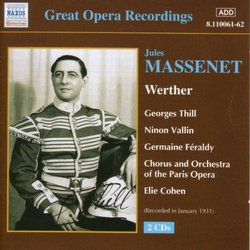| All Artists: Jules Massenet, Elie Cohen, Orchestre Du Theatre National De L'opera De Paris, Paris National Opera Orchestra, Ninon Vallin, Georges Thill, Germaine Feraldy Title: Massenet: Werther Members Wishing: 0 Total Copies: 0 Label: Naxos Release Date: 1/16/2001 Genre: Classical Style: Opera & Classical Vocal Number of Discs: 2 SwapaCD Credits: 2 UPC: 636943106129 |
Search - Jules Massenet, Elie Cohen, Orchestre Du Theatre National De L'opera De Paris :: Massenet: Werther
 | Jules Massenet, Elie Cohen, Orchestre Du Theatre National De L'opera De Paris Massenet: Werther Genre: Classical
|
Larger Image |
CD Details |
CD ReviewsAn INDISPENSABLE lesson in style and expression Charlus | NYC | 02/10/2005 (5 out of 5 stars) "France's two leading singers of the 1920-1940 era, heard in 1931, in an opera they both owned. As far as I am concerned, they still do. Thill (1897-1984), a fluent vocalist with the ability to sound like a young man in love, simply sounds like Werther: there is no distance between himself and the rôle; his identification with every syllable he is singing is total. This is one of the great classic assumptions of the gramophone. Ninon Vallin (1886-1961), a more brilliant vocalist per sè, with a better voice and a more subtle style, is a perfect foil for him: a tremendously conflicted Charlotte, profoundly disturbed below the cool exterior: Vallin does not miss a single nuance. And what phrasing, what tone! Both these artists understand the style and character of this music perfectly, have all the resources, vocal and technical, to do their parts justice, and simply give their all: what more could one ask? The 1931 sound has been expertly refurbished. All people who pretend to love opera simply have to get used to old recordings of musical greats. It comes with the territory. The music always comes first. As a filler, NAXOS adds some further Massenet arias superbly sung by Georges Thill: they too are indispensable. " The "Werther" against which all others must be measured L. E. Cantrell | Vancouver, British Columbia Canada | 07/02/2004 (5 out of 5 stars) "Source: Studio recording from the 1930s.Sound: This set is clearly a relic of the early days of electric recording, but still quite listenable, once one accepts its limitations. Voices are clearly captured, particularly that of Georges Thill, and given emphasis over the rather dimly-caught orchestra.Documentation: Naxos gives its standard package. There is a brief essay on the opera, accompanied by thumbnail biographies of the principal singers and all-but forgotten conductor. No libretto. There is a fairly useful plot summary tied to the track listings. (For those desperate for the words, a Google search under "Werther libretto" yields a serviceable French-English version.)"Werther" is very much a tenor's opera. Although there have been a number of recordings since this primordial set, and many fine tenors recorded, none has ever matched Georges Thill in the role of Werther. Thill is said to have been the last, great, classic French tenor. Perhaps he was, but he was a robust one, with none of the preciousness that such a description tends to conjure up. Why, he was still giving concerts of Wagner's music into his sixties! His tone is slightly dry, his diction precise and his control awesome. I say that despite the famously bobbled high note. He could, I assume, have simply re-recorded his aria to correct the error but, I further assume, his self-confidence was so great that he let it go, just as in a live performance. Or it might be that he wanted to get out of the recording studio without delay, for--so the oft-told tale goes--he and soprano, Ninon Vallin, despised one another and had a stormy recording session.Ninon Vallin is exactly what one imagines when one hears of a traditional French soprano. Hers was a bright, sharply focused voice, not great in size, but of wonderful precision. Her characterization of Charlotte is right on target: a perfectly ordinary bourgeois girl, with a perfectly ordinary bourgeois husband, who has the misfortune to be extravagantly loved by young Werther, a gormless and suicidal Romantic. The role was apparently intended for a mezzo, but it lies easily in the range of a soprano and has been performed successfully by singers in both ranges. The entire cast is French and steeped in the traditional French approach to opera. So, too, are the orchesta and conductor. That puts this recording in marked contrast to more recent sets, with their polyglot casts and one-size-fits-all international style.By all means, seek out the better fidelity of more recent recordings, but you are not likely to find a better performance during this lifetime. This is the classic standard for all recordings of "Werther," an excellent but too-rarely performed opera. Five stars--and well worthy of them!" The only authentic Werther recorded N. Freidin | Huntington, WV | 06/08/2006 (5 out of 5 stars) "This is the most authentic recording of Massenet's "Werther". No later singers can match Thill and Vallin (a soprano singing a mezzo role) in diction, voice, commitment, and feeling, for this masterpiece. The remastering, thanks to the genius of Ward Marston (born blind), hardly sounds like a recording from 1931. A real gem which catches the drama behind this moving story. The most French recording of this gallic opera. Perhaps best appreciated by listeners who are familiar with the work, but this recording can also open the ears of novices ?"
|

 Track Listings (20) - Disc #1
Track Listings (20) - Disc #1